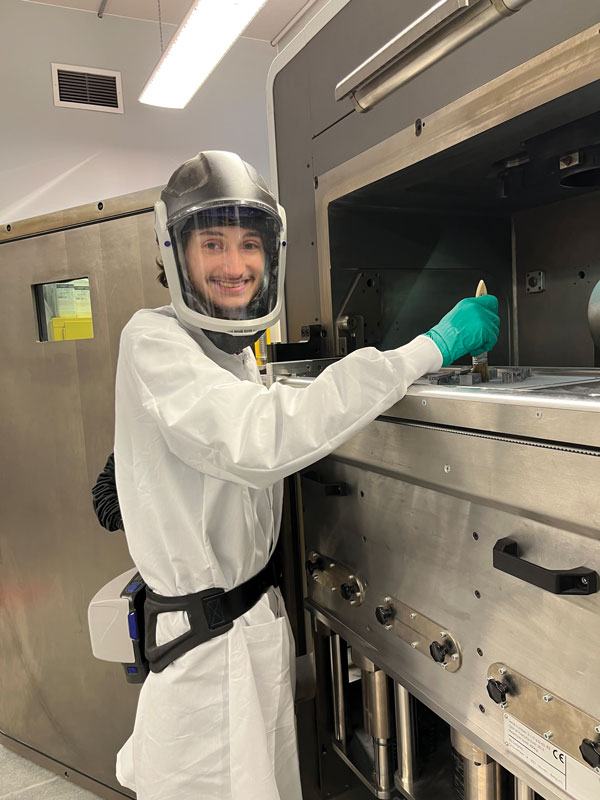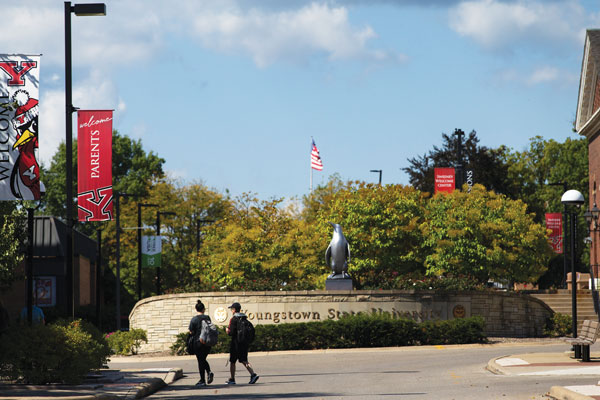Companies in eastern Ohio don’t have to look far for skilled talent. Youngstown State University (YSU) is leading the charge in cultivating a diverse and dynamic workforce through its innovative programs. From doctoral, graduate, and four- and two-year degrees to workforce certifications and credentials, YSU’s emphasis on industry-influenced curriculum and strategic partnerships not only addresses current workforce demands but also prepares students for the evolving job landscape. This collaborative approach between academia and industry is essential in ensuring a continuous pipeline of qualified workers for the region and beyond.
“If we don’t know from businesses and industries what their workforce needs are, then how can we know what type of workforce to put out?” says YSU President Bill Johnson. “We’re closely integrated with the business and industry community to make sure we understand what their workforce needs are and then we are turning out a highly educated, motivated set of graduates that can meet those workforce demands.”
To support these efforts, YSU has launched numerous workforce education and innovation initiatives, beginning with the opening of the Excellence Training Center (ETC) at Kolhi Hall in 2021. Located on campus, the ETC, which operates under the STEM College, houses over $10 million of advanced manufacturing equipment for workforce training, research and commercial projects.
“We do robotics, specifically FANUC robotics training, some universal robotics training, we do Rockwell Automation, Allen Bradley programmable logic controller training, and we do industrial maintenance, additive manufacturing and machining; these are the five main categories of training that we do here in the center hands-on,” says the ETC’s Director Jackie Ruller. “Besides running the ETC, we also have the IT workforce accelerator; we have programs like 5G readiness, Cisco, and CompTIA. We cover the gamut in that workforce umbrella of advanced manufacturing and IT.”
Outside of advanced manufacturing and IT, YSU also offers the Data Mine, an on-campus learning community in partnership with Purdue University where students in any major study the science of data and apply their knowledge to real world company-sponsored projects; the Williamson Innovation Park, a 162-acre open air research park where YSU students as well as area K-12 students can explore multiple STEM projects and conduct research in engineering, biosciences, aviation and more; and the Online Skills Accelerator, which provides individuals with industry-recognized credentials, including OSHA-training.
In addition to arming students with in-demand skills, YSU’s STEM college partners directly with companies to connect them with apprentices and employees and create tailored training for students and even their current workforce.
Steel fabricator NLMK Pennsylvania was originally going to build its own training center, but following a visit to the ETC, they decided to scrap those plans and send their workers to YSU for upskilling instead.
“We basically set up a program for them,” explains Ruller. “They wanted to train their production technicians to be electrical hands. So, we looked at all the courses in our industrial maintenance catalog, and they chose which ones they wanted them to do. We created an eighteen-month program where they are here in the center.”
For this project, the curriculum consisted of online work, instructor-led lectures, and hands-on training utilizing ETC’s state-of-the-art equipment. In between the courses, the trainees also participated in on-the-job training at their company. Following the cohort’s graduation from the program in October 2023, NLMK put the skills they had garnered to the test.
 At YSU’s Excellence Training Center (ETC), students in various degree and certifi cation programs are gaining valuable hands-on experience in high-demand skillsets.
At YSU’s Excellence Training Center (ETC), students in various degree and certifi cation programs are gaining valuable hands-on experience in high-demand skillsets.
Photo courtesy of Youngstown State University
“They all passed with flying colors,” says Ruller. “NLMK was so happy with the training that they started two more cohorts; one was electrical, and the other was mechanical. So, we have two different groups coming through now. That’s just one company sending all these people through our industrial maintenance training.”
Pioneering Innovation
YSU’s determination to help businesses advance their enterprise branches has led to revolutionary research projects such as Foundry 4.0. Funded by the Defense Logistics Agency, the ETC’s automated foundry is strengthening the supply chain by teaching small to medium-sized foundries throughout the country how to implement these technologies into their facilities.
“It’s a way to help these companies be safer, be competitive,” says Ruller. “They’re all very overwhelmed and short-staffed. It takes three or four people to do a pour in a foundry but, if you have an automated foundry, where the robots do all the work, you just need one person to program the robot.”
In helping these companies transition to Industry 4.0 technologies, YSU also offers its workforce training expertise to educate workers on these new practices. Alongside on-site courses, the ETC is currently developing online webinars that will be posted to the University’s website.
“It’s the perfect project that aligns with what we do,” says Ruller. “Higher education has got to be on its toes, flexible, agile, adaptable, and ready to move in this direction or that direction in order to meet the workforce needs of our dynamic economy,” adds President Johnson. “It needs to be a win-win for both sides of the equation, for businesses and industries that rely on us to create and educate their workforce and for the students, partners and stakeholders that are sending students to universities to get educated.”

